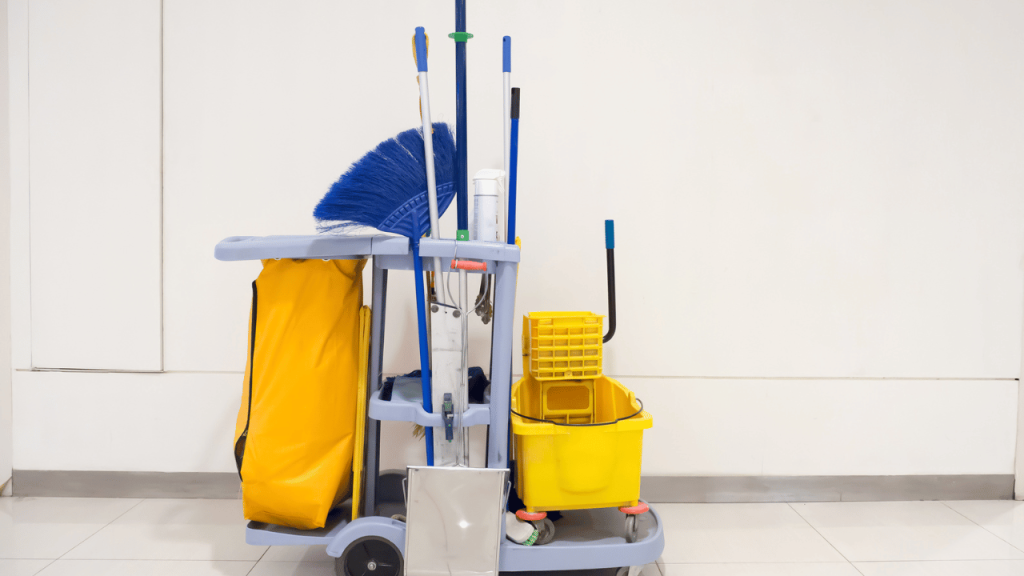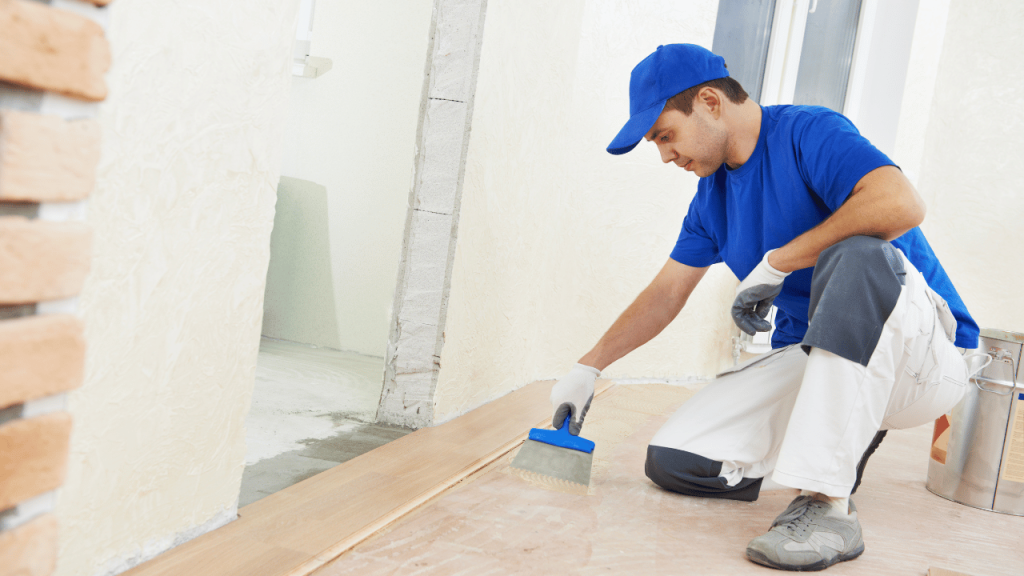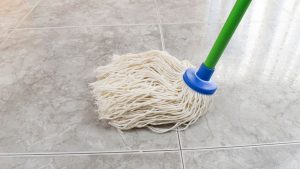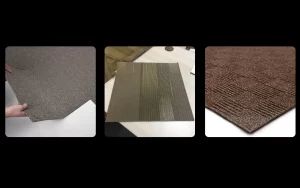- Introduction
- How Do You Remove Glue from Vinyl Flooring?
- Tools Needed for Vinyl Floor Cleaning.
- How to Clean Vinyl Floors with Ground-In Dirt
- How to Remove Paint from Vinyl Flooring
- How to Remove Adhesive from Vinyl Flooring
- Is Vinyl Flooring Waterproof?
- Can You Paint Vinyl Flooring?
- FAQ
- Conclusion
Table Of Content
Introduction
Vinyl floors are the most durable, affordable, and easier to install than hardwood floors, which is why they are in high demand. Even for the waterproof options, vinyl floors could be beneficial for your kitchen and bathroom.
Although vinyl floors are best curated and easy to manage, they require regular cleaning practices. Surprisingly, vinyl floors will last for a long time, as they have been famous for 10 to 20 years, but the condition is that they will last if you manage with proper care and cleaning. Fortunately, cleaning them is not an expensive trick; it comes at a cheap price.
Get ready to learn about the cheapest tricks, techniques, cleaning tools, and agents to keep your vinyl floor in shape! We have created a proper guide to help you throughout this cleaning.
How Do You Remove Glue from Vinyl Flooring?
Effective Methods for Glue Removal
Is there a glue on your vinyl floor? We get it; you do not need to panic. There are multiple ways you can remove the glue. For this, start with a basic cleaning to soften the glued area, it can be helpful in avoiding any damage to vinyl floor.
Hence, to remove the glue, see if it is wet or dry.
If you have wet glue on your vinyl floor, you can easily remove it with a plastic scraper and Cloth. But, if it is in dried form, it is advised to use a rubbing alcohol, special adhesive remover, or nail polish remover to remove the glue without causing any damage to the flooring.
Tools Needed for Vinyl Floor Cleaning.

- Plastic Scrapper.
- Sponges.
- Soft and dry Cloth.
- Warm Water.
- Nail polish Remover.
- Rubbing Alcohol.
- Gloves.
- Vacuum Cleaner.
- Microfibre Mop.
- Steam Cleaner.
- Soft Bristles.
- White Vinegar.
How to Clean Vinyl Floors with Ground-In Dirt
Deep Cleaning Techniques for Tough Dirt
Your vinyl flooring can easily catch dust and debris from the wind or unclean shoes. You must be careful about this, as it can wash out the vibrant flooring texture. But don’t stress; it can be easily cleaned.
To clean ground-in dirt, start with vacuum cleaning to avoid any surface damage. Now, mix warm water and dishwasher soap to gently clean the debris. Even a microfibre cloth or mop will help. Rinse the floor properly and use baking soda to remove the tougher stains. Remember to use a soft steam cleaner; otherwise, your floor can start to get damaged.
How to Remove Paint from Vinyl Flooring

Safe Paint Removal Techniques
Hold on! After furnishing or decorating the house, the paint splats can remain on your floor; it is pretty normal and can be removed easily.
Try to remove it as it is wet; otherwise, it gets trickier when it becomes dry. For smaller or larger paint spills, you can use rubbing alcohol, detergents, or a water mixture to clean the floor.
However, The easiest way is to use a plastic paint scrapper; it won’t damage your floor like a razor blade. For the most stubborn paint splits, you can choose the scrub solution.
How to Remove Adhesive from Vinyl Flooring
Best Practices for Adhesive Removal
During the installation, some glued adhesive can stick to your vinyl floor, which needs to be removed. For this, the most trusted one is scraping; wood scraps is the most recommended one for you. As it does not cause any damage or dust to the entire floor. But, it can take longer time in some cases, but you have to bear it for your vibrant flooring.
Another practice involves using Goof Off on the vinyl tiles to clean up the rough and strong adhesive. But make sure to try it on the scrapper first as a precautionary measure for your floor.
Is Vinyl Flooring Waterproof?

Understanding Vinyl’s Water Resistance
Vinyl flooring water resistance and waterproof capabilities are two different concepts. In waterproof vinyl floor system, it is made with multiple layers of water protection to avoid the penetration of water. Hence, it is more resistant to water spills and floods.
But, in the case of water resistance flooring, mostly offered in LVP and LVT, the material used in it has the ability to shed off the water for a specific time. But be mindful that the long exposure of water can result in the water seeping into the floor.
Depending on your choice, vinyl flooring can be waterproof and resistant. However, most homeowners prefer water-resistant vinyl floors.
Can You Paint Vinyl Flooring?
Pros and Cons of Painting Vinyl Flooring
Of course, you can paint your vinyl flooring to give it a new and customized look. There are multiple designs and colors available, which you can select for your floor. Instead of replacing the entire floor, it is better to paint it with fresh and vibrant colors, which means highly cost-effective transformation.
But it is not that simple; you have to take some precautions to avoid any wear and tear. Hence, it is advised to use a less rushy place with good ventilation during painting and drying. Remember: it is a temporary adaptation of your floor, not a permanent solution.
Frequently Asked Questions
How to Remove Glue from Vinyl Flooring? [+]
To remove the glue, do the basic cleaning first and then use a plastic scrapper or rubbing alcohol for wet or dry glue, respectively.
How to Get Paint Off Vinyl Floor? [+]
To get off your vinyl floor paint, it is recommended to use a plastic paint scrapper or rubbing alcohol or detergent to loosen the paint area and remove it after it.
How to Remove Adhesive Vinyl Flooring? [+]
You can use the wood scraper and goof off detergent to clean your floor from adhesive spots.
Is Vinyl Floor Waterproof? [+]
Yes, depending on your choice, it can be both waterproof and water-resistant. However, before considering the installation, be mindful that these are different concepts.
Can You Paint Vinyl Tile Floors? [+]
With some precautions, you can paint your floor. But have to avoid walking until it dries.
Is Vinyl Plank Flooring Waterproof? [+]
Yes, it is waterproof and is more famous in wet areas such as the basement, kitchen, and bathroom.
What Is the Best Thing to Wash Vinyl Floors With? [+]
Natural techniques, such as vinegar, baby oils, and dishwashers, are best for basic vinyl floor cleaning.
What Not to Clean Vinyl Floors With? [+]
You are advised not to use steam mops, abrasive materials, or detergents for a longer run to avoid any damage.
Does Vinegar Damage Vinyl Flooring? [+]
Vinegar can cause dislocation and swelling if it is used with excessive water. However, white vinegar can be used to clean vinyl flooring.
Is Dawn Dish Soap Safe for Vinyl Floors? [+]
Yes, it is safe, but it should be used in limited quantities. Make sure to rinse the floor often to avoid wear and tear.
Conclusion
Just in case your vinyl floor gets dirty with glue, paint, or adhesive, you do not need to worry. You must follow the above guide and instructions for the proper clean-up without creating any disturbance or damage to your vinyl floor. However, if the floor is not even clean after it, you must contact the experts for an immediate solution.








